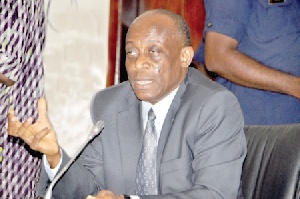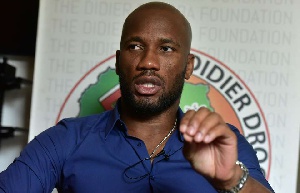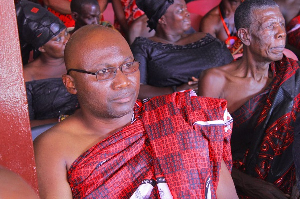Business News of Friday, 20 November 2015
Source: B&FT
Investment guarantees will address energy crisis – Terkper
Finance Minister Seth Terkper has assured Ghanaians of government’s commitment to resolving the energy crisis, maintaining that over 1,053MW of power will be added to the generating capacity over 2016 in a bid to address the energy situation.
Mr. Terkper said: “It is our expectation that investments by the public and private sectors including the emergency power barges; World Bank PRG for Sankofa field; commissioning of FPSO J.E.A Mills for the TEN fields; and onset of Jubilee Gas will contribute to the positive outlook in the energy sector,” he said.
“In 2016, government will continue to pursue its objective of increasing the installed generation capacity of the country to meet the growing demand for electricity. In this regard, a total of 1,053MW installed capacity is scheduled to be added to the existing installed capacity of the country,” he said.
Currently, Ghana has an installed generating capacity of about 2,800MW with peak demands estimated at about 2,000MW. However, the inability to produce power at the required level has resulted in a situation where supply is unable to keep pace with demand, leading to what indigenes called “dumsor” – the load management programme.
Mr. Terkper also explained that as part of measures to address the ongoing power supply challenges, government is working on selected fast-track projects -- two of which are the 250MW Ameri and the 225MW Karpower Projects. Installation works are progressing steadily and the projects are expected to be commissioned before end of the year.
Petroleum Minister Kofi Armah Buah also maintained that the focus of government is to ensure that the country has sufficient indigenous gas to power the thermal plants. He added that by the middle of 2016, government will be commissioning the TEN project.
“I think government has shown a lot of commitment by playing a part in guaranteeing part of this project. Yes, we have had challenges but there is hope for Ghana. We are on the right track.”
Terkper also disclosed the Electricity Company of Ghana (ECG’s) projections for 2016; ECG will continue with the sub-transmission, automation (SCADA) and distribution projects, and the implementation of Ghana Compact II to put ECG and NEDCo on a path toward operational turnaround. The global coverage of prepayment metering is expected to increase from 40 percent to 75 percent by the end of 2016. As a result of the interventions, the ECG revenue collection is envisaged to increase to 95 percent of current year sales, and the debt stock be reduced by 10 percent.
According to Terkper, implementation of the six projects under the Millennium Challenge Compact has progressed steadily. Under the Ghana Power Compact, a Transaction Advisor was engaged to advise government on the ECG Private Sector Participation activity. Government will continue to work with the Millennium Development Authority (MiDA) and the MCC on the six Compact projects, namely: ECG Financial and Operational Turnaround project, NEDCo Financial and Operational Turnaround Project, Access to Electricity Project, Regulatory Strengthening Project, Capacity Building Project, Power Generation Sector Improvement Project, and Demand Side Management and Energy Efficiency Project.
The Ghana Energy Development and Access Project (GEDAP) 1 and 2, he said, are almost complete -- with outstanding activities being the prepayment metering projects and ECG Customer Services Management (CMS) system deployment, which is 80 percent complete.
Furthermore, in 2016 distribution improvement and intensification in ECG and NEDCO operational areas; Geographical Information System (GIS) deployment in ECG & NEDCO areas; Institutional development and capacity building in ECG, NEDCO, regulatory agencies and the Ministry will be implemented under the GEDAP 3 Projects.
In line with the goal to achieve universal access to electricity by 2020, 550 communities were energised or connected to the national grid as at the end of September, 2015. The national electricity access rate increased from 75.6 percent in 2014 to 80.5 percent as of September 2015. In 2016, the ministry intends to connect over 1,500 communities to the grid from various interventions.
The country has been battling with nationwide load-shedding for the past three years, and especially given assurance of emergency power barges, experts say the country’s energy deficit can be resolved for the long-term.
Government says it expects to have a generation target of 5,000MW capacity by 2016, in a bid to make Ghana a hub for electricity generation as well as a net exporter of electricity in the West African Sub Region.











